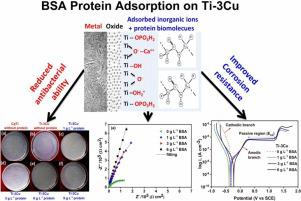Journal of Materials Science & Technology ( IF 10.9 ) Pub Date : 2020-12-24 , DOI: 10.1016/j.jmst.2020.11.046 Muhammad Ali Siddiqui , Ihsan Ullah , Hui Liu , Shuyuan Zhang , Ling Ren , Ke Yang

|
The adsorption behavior, antibacterial, and corrosion properties of a Ti-3Cu alloy were studied in a phosphate-buffered saline solution containing 0, 1, 3, and 6 g L−1 bovine serum albumin protein at 37 °C and pH = 7.4 (±0.2). The protein adsorption behavior was examined via cyclic voltammetry, secondary ions mass spectroscopy (SIMS), and angle-resolved X-ray photoelectron spectroscopy (ARXPS). The corrosion property was analyzed by the open circuit potential (OCP), potentiodynamic polarization (PD), and electrochemical impedance spectroscopy (EIS) examinations. The antibacterial test was conducted according to the GB/T 21510 China Standard. It was observed that the surface charge density (QADS) was directly proportional to the amount of the adsorbed BSA protein, signifying that the protein adsorption was accompanied by the charge transfer, pointing to chemisorptions phenomena. BSA amino groups and other organic species were observed in the surface analysis examinations. It was shown that the formation of barrier complexes between the TiO2 oxide-layer and PBS solution resulted in decreasing the release of Cu-ions, which consequently reduced the antibacterial activity. On the other hand, these barrier complexes improved the corrosion resistance by increasing the charge transfer resistance and double-layer capacitance of the Ti-3Cu alloy.


























 京公网安备 11010802027423号
京公网安备 11010802027423号